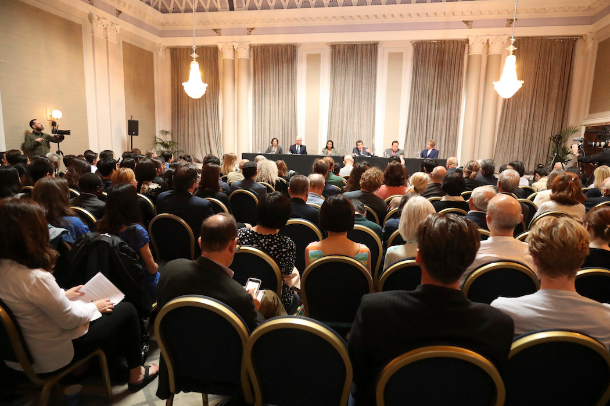Action needed to end organ harvesting in China
Tribunal's judgment that organ harvesting is continuing should prompt nations to seek justice.
The China Tribunal, chaired by Sir Geoffrey Nice, QC, delivered its final judgement about state involvement in organ harvesting in China on June 17. (Photo by Justin Palmer)
The lawyer who led the prosecution of Slobodan Milosevic, Sir Geoffrey Nice QC, said last week that anyone who interacts with the Chinese Communist Party regime should recognize that they are “interacting with a criminal state.” He said what so many people think, so many people want to say, but so few around the world dare these days to express.
In delivering the final judgment of the 12-month-long independent China Tribunal into forced organ harvesting of prisoners of conscience in China, Sir Geoffrey spoke for the seven-member panel that consisted of four lawyers, a prominent businessman, an academic and a senior surgeon. None of them had any prior interest or involvement either in human rights in China generally, religious persecution in particular or the allegations of forced organ harvesting — which have been around for a decade or more — specifically.
The panel made repeated attempts to invite officials of the People’s Republic of China to give their side of the story, and those who believe China’s organ transplant system is ethical and defensible, but were met with silence. They concluded, after hearing many hours of testimony under courtroom-style interrogation, and after reviewing numerous reports, papers and analysis, that forced organ harvesting has occurred over the past two decades — and, crucially, continues to this day.
What does this mean in international law? It means that, as the panel concluded, such acts constitute crimes against humanity, which tribunal members are certain beyond reasonable doubt have occurred.
So what next? The China Tribunal has done its job — it is over to governments to respond, the media to ask questions, and responsible citizens to exercise their influence. It was, after all, a “People’s Tribunal” in the best sense of the term, an exercise by civil society embarking on an investigation that thus far governments and the United Nations have shied away from. It has been the People’s Tribunal versus the People’s Republic, and it is clear which is truly on the side of the people.
Governments — especially those which profess to care about human rights — must take this judgment seriously. If they disagree with the findings, they must provide clear evidence and analysis as to why. If they can’t, and they won’t speak out, silence must be taken as complicity. The populace in democratic societies must press their elected representatives on this — apathy in the face of such crimes is not an option.
In an ideal world, governments would take the findings of the China Tribunal and act. They should prosecute those responsible for such crimes, and hold them accountable, through international justice mechanisms.
In a realistic world, we all know that, while it is a goal to keep on the table, accountability for mass atrocities — which forced organ harvesting from prisoners of conscience on a systematic scale surely is — takes years of slow, painstaking, thankless, tireless hard work, with no guarantee of result. Just ask Raphael Lemkin, who led the campaign for the Genocide Convention.
One of the strengths of the China Tribunal is that it stops short of a conclusion of genocide — for evidential and strategic reasons. It concludes, however, that it has “no doubt whatsoever that physical acts have been carried out that are indicative of genocide.” All the more reason to act.
If governments won’t prosecute, what else could they do? They could ban their citizens from travelling to China for organ transplants, something Israel, Taiwan and Spain have done.
Doctors, medical institutions, pharmaceutical companies, law firms, financial services providers, airlines and others ought to review their dealings with what has been described as a criminal state.
Those who deny this barbaric crime should — unless other evidence arrives to the contrary — ought to be presented as akin to Holocaust deniers. The film Denial is well worth watching, and I recommend it to all.
At the very least, this inquiry — led by the man who prosecuted one of the late 20th century’s war criminals, supported by the former chair of the Malaysian Bar Council’s human rights committee, the founder of the Big Yellow enterprise, exiled Iranian lawyer Hamid Sabi who helped uncover the truth about massacres in Iran, and the co-medical director at Great Ormond Street Hospital — ought to be taken seriously.
A senior British barrister, a prominent Malaysian lawyer, an exiled Iranian with no prior interest in China, a professor of pediatric cardiothoracic surgery, an entrepreneur, an academic and two other lawyers don’t just make stuff up. They have come to a judgment. Now it is time to act.
Benedict Rogers is East Asia team leader of international human rights organization CSW and is deputy chairman of the Conservative Party Human Rights Commission.
The views and opinions expressed in this article are those of the author and do not necessarily reflect the official editorial position of ucanews.com.


 Votes : 0
Votes : 0









